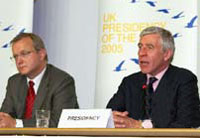
An emergency meeting of European Union (EU) foreign ministers failed to remove the last hurdle to accession talks with Turkey by early Monday, casting doubt on the formal opening of talks in the afternoon.
British Foreign Secretary Jack Straw, whose country holds the EU presidency, admitted that the EU is in a "frustrating situation."
But bilateral talks between the EU presidency and the European Commission with Austria will continue into the night, Straw told a brief press conference.
Austria's insistence that talks with Ankara would lead to something like "privileged partnership" instead of full membership remains the major obstacle to the formal launch of talks on Monday afternoon.
Turkey has made clear that such an option is not acceptable.
Straw would not say whether or not the talks could start as scheduled on Monday.
"The time for formally beginning the negotiations ... is 5 p.m. (1600 GMT) tomorrow (Monday) afternoon. It's still possible. But it could sleep. Obviously, it's uncertain," said Straw.
EU commissioner for enlargement, Olli Rehn, expressed optimism.
"I'm confident that we shall have a positive outcome and start negotiations tomorrow (Monday)," he told the same press conference.
Swedish Foreign Minister Laila Freivalds told reporters shortly after the end of the emergency meeting that Austria should drop its demand.
Asked whether she saw movements by the Austrians in the talks, she replied: "Very little, I'm afraid. They have to move more, they have to drop their demand."
The foreign ministers will meet again later in the morning to discuss the issue.
At an EU summit in December, EU leaders decided to launch membership negotiations with Turkey this Monday. The start of the talks, however, hit a snag when Austria insisted on giving the Muslim country a "privileged partnership."
According to the EU's rules, Turkey's entry needs the "nod" from all 25 EU member states. The foreign ministers were trying to work out a negotiating framework -- basic rules -- for the negotiations, which are expected to last 10 years or longer.
The Turkey talks appear to be ill-timed as the EU itself has to put its house in order after its constitution was vetoed in France and the Netherlands, and the 25-nation bloc has to sort out a budget for 2007-13.
Ordinary Europeans generally take a negative attitude toward Turkey's EU membership, opinion polls show.
In France and Germany, the so-called EU engine, 47 percent of the population in France are against Turkey's accession while merely 11 percent are in favor. In Germany, the figures are 40 percent, 15 percent and 43 percent respectively, according to a recent survey conducted by Transatlantic Trends.
Turkey signed a protocol in July to extend its customs union agreement to the 10 new EU member states, including Cyprus, satisfying the conditions for the start of membership talks.
However, Ankara said at the same time that the signing of the protocol did not mean any form of political recognition of Cyprus.
Ankara refuses to recognize the Greek-Cypriot government in the south, which represents the whole Republic of Cyprus in the EU. EU rules require a new member state to recognize all its existing members.
The EU governments issued a compromise counterstatement last month, allowing Turkey to recognize Cyprus before it formally joins the EU, thus making the start of talks on Monday possible.
(Xinhua News Agency October 3, 2005)
|

